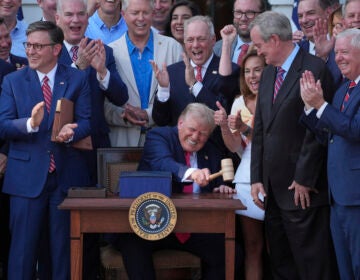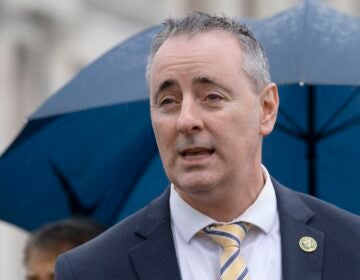Toomey pushes for permanent earmarks ban
U.S. Sen. Pat Toomey, who called earmarks the “gateway drug” to more government spending, intends to ask Congress to enact a permanent ban.
Pennsylvania’s junior senator reintroduced a bill to prevent lawmakers from requesting funds that would go straight to their districts.
“How many big bloated pieces of legislation passed because somebody got a bridge or a tunnel or an earmark that was specific to their state?” asked Toomey when outlining the newest version of the legislation.
Congress currently has a moratorium on earmarks, but legislators have found various ways to circumvent it. What’s more, it’s only a temporary ban.
The bill from Toomey and Democratic co-sponsor Sen. Claire McCaskill of Missouri would make it permanent.
In addition to bridges and tunnels, the earmark ban also prohibits more obscure items such as reducing import tariffs for specific products companies can’t find in the U.S.
Tariff breaks targeted
Companies submit each tariff break through a local representative. To get through Congress, they get packaged into a megabill.
Sponsors come from both parties.
In Pennsylvania, Sen. Bob Casey (D) and Rep. Mike Fitzpatrick (R-Bucks County) have shepherded through tariff reductions.
In July, WHYY reported that Fitzpatrick submitted eight bills on behalf of United Color Manufacturing, a little over a month after the owner, his wife and son contributed $7,500 to his campaign. Their total donations in the 2012 cycle consequently exceeded campaign contribution limits. Some of that money was refunded in April.
Thomas Nowakowski Jr. and Sr. of United Color Manufacturing made their only donations to a Democrat in the 2008 through 2012 cycles to Casey in August, each giving $2,500.
Back in July, Fitzpatrick and his colleagues in the House provided written statements.
Supporters of tariff reductions make a powerful argument.
Many of the tariff breaks apply to chemicals and other raw ingredients in industrial manufacturing.
After Congress failed to pass the Miscellaneous Tariff Bill by the end of the 112th Congress, National Association of Manufacturers vice president Linda Dempsey gave this statement: “Congress has increased costs on manufacturers,” she said, “and made it more difficult for manufacturers to maintain and grow production and jobs in the United States.”
Pennsylvania Manufacturers Association representative David Taylor says he is more focused on cutting government spending and the national debt.
“We want strong fundamentals,” said Taylor. “We want to attack baseline cost of doing business and creating a job. What is not helpful in the long run is having a subsidy or a special favor things like that. It just ends up distorting the marketplace.”
The latest package of tariff reductions needs to be reintroduced in the current Congress.
WHYY is your source for fact-based, in-depth journalism and information. As a nonprofit organization, we rely on financial support from readers like you. Please give today.




